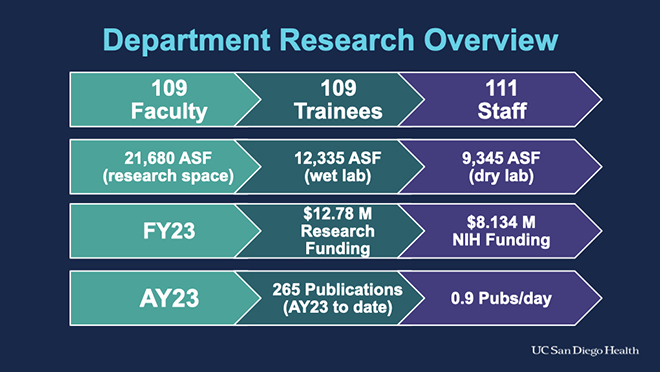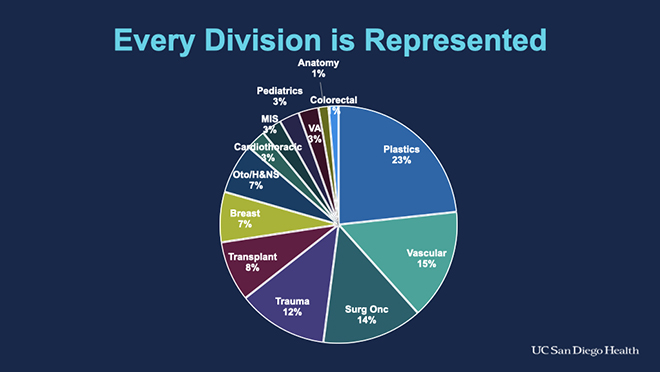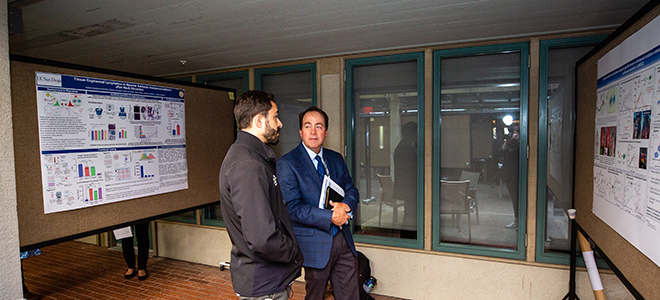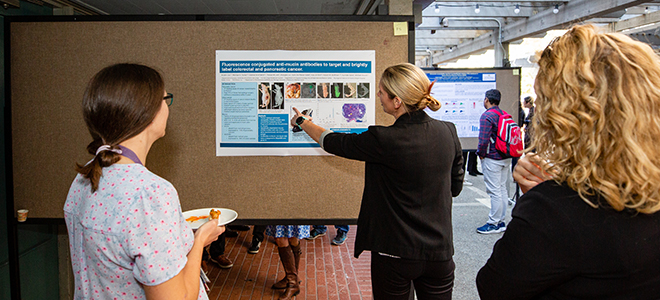The “Moral Obligation” of Surgery: UC San Diego Surgery Gathers for Annual Research Symposium
The 11th Annual UC San Diego Department of Surgery Research Symposium, held May 3 at the UC San Diego Faculty Club, brought together faculty, trainees, and medical students to present and discuss their latest research and advancements in the surgical sciences.  Noting that UC San Diego has a “moral obligation to conduct research,” Department Chair Bryan M. Clary, MD, FACS, welcomed those gathered for this annual review of UC San Diego Surgery’s academic work. Among them were members of the Department’s 109 faculty and 109 trainees, in addition to several members of its 111-member clinical and administrative staff.
Noting that UC San Diego has a “moral obligation to conduct research,” Department Chair Bryan M. Clary, MD, FACS, welcomed those gathered for this annual review of UC San Diego Surgery’s academic work. Among them were members of the Department’s 109 faculty and 109 trainees, in addition to several members of its 111-member clinical and administrative staff.  A total of 73 abstracts were presented – including 24 oral presentations and 49 poster presentations – with all 13 divisions of the Department represented. Among the research showcased at the event were projects in basic/translational science, clinical research, health services research, engineering and robotics research, education research and global surgery research. “The breadth and depth of science being performed in the Department is so impressive and invigorates everyone’s desire to continue making new discoveries to advance patient care,” said Jason Sicklick, MD, FACS, Executive Vice Chair of Research. (See sidebar for a list of winning abstracts.)
A total of 73 abstracts were presented – including 24 oral presentations and 49 poster presentations – with all 13 divisions of the Department represented. Among the research showcased at the event were projects in basic/translational science, clinical research, health services research, engineering and robotics research, education research and global surgery research. “The breadth and depth of science being performed in the Department is so impressive and invigorates everyone’s desire to continue making new discoveries to advance patient care,” said Jason Sicklick, MD, FACS, Executive Vice Chair of Research. (See sidebar for a list of winning abstracts.)
“Not only do we have to do this work, but we also get to do this work,” noted Dr. Clary. “There is an innate sense of joy in discovery. To me, that is the excitement of being a surgeon-scientist.”
One of the highlights of the symposium was the keynote address by Christine L. Lau, MD, MBA, the Chair of the Department of Surgery and Surgeon-in-Chief at the University of Maryland. Dr. Lau's keynote address was titled "Always Bet on a Surgeon" and focused on the trials, tribulations, and successes of the University of Maryland Cardiac Xenotransplantation Unit, which has been conducting ground-breaking research and clinical work in the use of animal organs for heart transplant patients.
Dr. Lau began by highlighting the challenges that the unit faced in the early days of this field. "We thought xenotransplantation was five years away and always would be," she said. She explained that one of the major challenges of xenotransplantation is hyperacute rejection, which occurs when the recipient's immune system recognizes the transplanted organ as foreign and attacks it within minutes to hours of the transplant. This type of rejection is caused by pre-existing antibodies in the recipient's blood that recognize the donor's organ as foreign. In 1984, Baby Fay, received a baboon heart transplant – the first time that a baboon heart had been transplanted into a human infant. Although Baby Fay eventually died, her case sparked a worldwide debate about the ethics of using animal organs for human transplantation.
Despite the many obstacles, Dr. Lau and her team continued to push forward. Dr. Lau then discussed a more recent case – University of Maryland patient David Bennett, a 57-year-old man who suffered from end-stage heart failure and was not expected to survive without a heart transplant. As described in the New England Journal of Medicine in July 2022, he was not a candidate for human heart transplantation. Therefore, he was given the option of participating in the University of Maryland's xenotransplantation program.
Dr. Lau explained that the team at the University of Maryland used a genetically modified pig heart for the transplant, which made it less likely to be rejected by the human immune system. The surgery was a success, and David Bennett lived for 60 days with the pig heart, setting a record for the longest that anyone has lived with a xenotransplanted heart.
The team faced many challenges in maintaining Bennett's health, as noted by Dr. Lau in her talk. One of the most formidable was the possibility of hyperacute rejection, which can lead to organ failure. To prevent this, the team had to constantly monitor David Bennett's antibody levels and adjust his medications accordingly.
Another of the team’s worries was infections. Because the pig heart was foreign to Bennett's body, he was more susceptible to infections. The team at the University of Maryland had to be hyper-vigilant in monitoring for infections and treating them promptly.
Dr. Lau concluded her talk by highlighting how her surgical team at the University of Maryland faced and overcame numerous challenges in their quest to develop a viable xenotransplantation program. "It's like peeling back an onion," she said, "there could be many reasons for a survival rate of only one year."
However, she remained optimistic about the future of xenotransplantation and the potential that it holds for patients who are in need of organ transplants. Xenotransplantation is no longer the perpetual five years away…it is here and now.
UC San Diego Research Symposium Awards
Postdoctoral Researcher: Best Oral Presentation for Basic/Translational/Engineering Research
Ashwyn K. Sharma, Alexander T. Wenzel, John Jun, Chih-Min Tang, Shruti Bhargava, Diwakar Guragain, Jill P. Mesirov, Jason K. Sicklick, “Single-nuclei Reference Mapping of Human Gastrointestinal Stromal Tumors (GIST) onto Enteric Nervous and Mesenchymal Cells Defines Tumor Cell States,” from the Division of Surgical Oncology
Postdoctoral Researcher: Best Oral Presentation for Clinical/HSR/Education Research
Victoria A. Bendersky, Allan B. Massie, Macey L. Levan, Elizabeth A. King and Dorry Segev, “Development of a Machine Learning Decision Aid for Liver Waitlist Survival,” from the Division of Transplantation and Hepatobiliary Surgery
Medical Student: Best Oral Presentation
Emma E. Williams, C. Haaland, L.N. Haines, K. Dwight, A. Valdovino Gonzalez, J.J. Doucet, A.K. Schwartz, W.T. Kent and T.W. Costantini, “Falling from New Heights: Traumatic Fracture Burden and Resource Utilization Following Border Wall Height Increase,” from the Division of Trauma, Surgical Critical Care, Burns and Acute Care Surgery
Best Poster Presentation for Basic/Translational/Engineering Research
Kevin Christian Montecillo Gulay, Xinlian Zhang, Edgar Esparza, Jay Patel, Deepa Babu, Evangeline S. Mose, Jonathan Weitz, Minya Pu, Andrew M. Lowy and Herve Tiriac, “Dual inhibition of KRAS G12D and pan-ERBB is synergistic in pancreatic ductal adenocarcinoma,” from the Division of Surgical Oncology
Best Poster Presentation for Clinical/HSR/Education Research - $25 gift card
Munir Paul Moacdieh, Sina Zarrintan, Daniel Willie-Permor, Shima Rahgozar and Mahmoud Malas, “Open versus Endovascular Left Subclavian Artery Revascularization Outcomes in Thoracic Endovascular Aortic Repair: A National Study,” from the Division of Vascular Surgery
